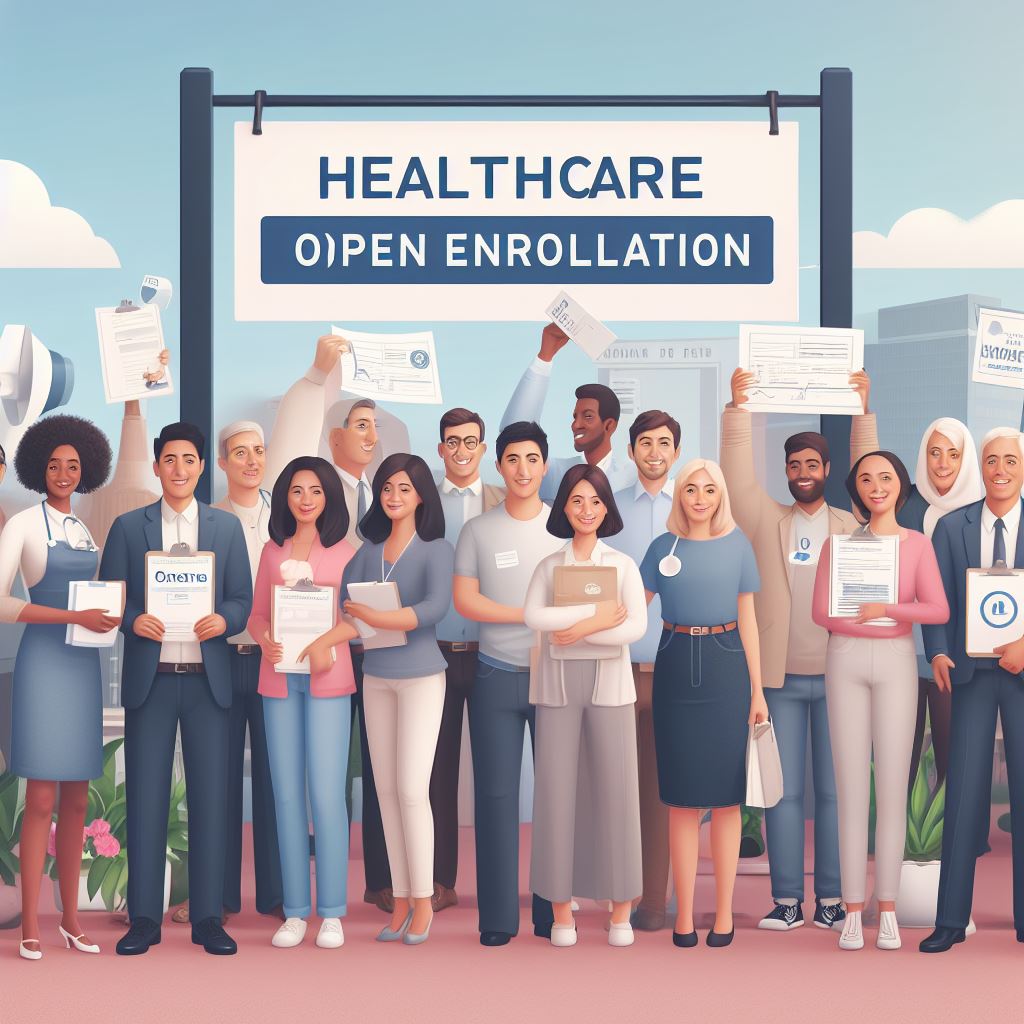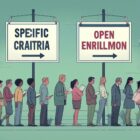Why Are You Eligible for Healthcare Open Enrollment?

Are you ready to take charge of your healthcare?
It’s that time of year again when you have the opportunity to enroll in a healthcare plan that meets your needs. Whether you’re an employee, a student, or someone experiencing a qualifying life event, open enrollment is your chance to secure the coverage you deserve.
Don’t miss out on this chance to protect your health and well-being. Find out why you’re eligible for healthcare open enrollment and make an informed decision today.
Key Takeaways
- Eligible individuals include employees and their dependents, students and recent graduates, individuals experiencing a qualifying life event, uninsured individuals seeking coverage, and those whose previous coverage is expiring.
- Healthcare open enrollment provides an opportunity to review and make changes to healthcare coverage, such as adding or removing dependents, switching to a different healthcare provider, and changing coverage options.
- There is a variety of plans available, including student health insurance plans for students and different options for individuals during open enrollment.
- Qualifying life events, such as marriage, divorce, having a child, job loss, or moving, allow individuals to enroll in a plan outside the regular open enrollment period, with a limited time to do so.
Employees and Their Dependents
As an employee, you and your dependents are eligible for healthcare open enrollment. This means that you have the opportunity to review and make changes to your healthcare coverage. During this period, you can add or remove dependents from your plan, switch to a different healthcare provider, or change your coverage options.
Open enrollment is an important time to assess your healthcare needs and make any necessary adjustments. It allows you to ensure that you and your dependents have the right coverage for your medical needs. Whether you need to add a new family member or make changes to your existing coverage, open enrollment provides the flexibility to do so.
It is crucial to take advantage of open enrollment because it’s typically the only time of the year when you can make changes to your healthcare plan without a qualifying life event. Missing this opportunity may mean being locked into a plan that no longer meets your needs or being unable to make changes until the next open enrollment period.
As an employee, you have the responsibility to stay informed about open enrollment dates and any updates to your healthcare options. Make sure to review the information provided by your employer or human resources department to understand the available options and deadlines.
Students and Recent Graduates
If you’re a student or recent graduate, you’re also eligible for healthcare open enrollment. This means that you have the opportunity to enroll in a health insurance plan that suits your needs. As a student or recent graduate, you may have limited income or be transitioning into the workforce, making it important to have access to healthcare coverage. Open enrollment allows you to choose from a variety of plans, including those specifically designed for students or young adults.
Health insurance plans can provide coverage for a range of medical services, including doctor visits, prescription medications, preventive care, and emergency services. By enrolling in a healthcare plan, you can have peace of mind knowing that you’re protected financially in case of unexpected medical expenses.
In addition to the traditional health insurance plans, there are also options available for students and recent graduates. Some colleges and universities offer student health insurance plans that provide comprehensive coverage at affordable rates. These plans are specifically tailored to meet the needs of students and may include benefits such as coverage for mental health services and access to on-campus clinics.
It is important to take advantage of healthcare open enrollment as a student or recent graduate, as it can provide you with the necessary coverage to protect your health and financial well-being.
Individuals Experiencing a Qualifying Life Event
You may be eligible for healthcare open enrollment if you have experienced a qualifying life event. A qualifying life event is a significant change in your life that may affect your healthcare needs. Examples of qualifying life events include getting married or divorced, having a child, losing your job, or moving to a new state.
If you experience one of these events, you may be able to enroll in a health insurance plan outside of the regular open enrollment period. This is important because it allows you to have access to healthcare coverage when you need it the most. To take advantage of this opportunity, you’ll need to provide documentation of your qualifying life event, such as a marriage certificate or a letter from your employer stating your job loss.
It’s important to note that you usually have a limited amount of time to enroll in a plan after experiencing a qualifying life event, so it’s important to act quickly. By understanding and taking advantage of this provision, you can ensure that you have the healthcare coverage you need during times of significant change in your life.
Uninsured Individuals Seeking Coverage
If you have been without insurance, now is the time to explore your options during healthcare open enrollment. This is your chance to find a plan that meets your needs and protects you and your family’s health.
Here are four key things to consider as an uninsured individual seeking coverage:
- Affordable options: During open enrollment, you can find affordable healthcare plans that fit your budget. Look for plans with lower monthly premiums and out-of-pocket costs that won’t break the bank.
- Essential health benefits: Make sure the plan you choose covers essential health benefits, such as preventive care, prescription medications, maternity care, mental health services, and emergency care. These benefits are crucial for maintaining your overall well-being.
- Network of providers: Check if the plan includes a network of healthcare providers that you prefer. Having access to doctors, specialists, and hospitals near you can ensure you receive quality care when you need it.
- Financial assistance: Depending on your income, you may be eligible for financial assistance such as premium tax credits or cost-sharing subsidies. These can help make healthcare more affordable and reduce your out-of-pocket expenses.
By exploring your options and understanding these key factors, you can find the right healthcare coverage during open enrollment and gain peace of mind knowing you’re protected.
Don’t delay, take advantage of this opportunity to secure the coverage you need.
Those Whose Previous Coverage Is Expiring
When your previous coverage is expiring, it’s important to take action during healthcare open enrollment. Open enrollment is the designated period when you can sign up for a new healthcare plan or make changes to your existing coverage. This is especially crucial if your current plan is coming to an end.
During open enrollment, you have the opportunity to compare different plans and find one that best suits your needs and budget. It’s a chance to evaluate your healthcare requirements and ensure that you have adequate coverage for the coming year.
If you fail to take action during open enrollment, you may face a gap in coverage, leaving you vulnerable to unexpected medical expenses. Additionally, if you miss the open enrollment deadline, you may not be able to enroll in a new plan until the next enrollment period. This could result in being uninsured for an extended period, which can have serious financial consequences.
To avoid any disruptions in your healthcare coverage, be proactive. Mark the open enrollment period on your calendar and set a reminder. Take the time to research different plans and compare their benefits, networks, and costs. Consider factors such as your current health needs, prescription medications, and any upcoming medical procedures.
Frequently Asked Questions
What Is the Deadline for Healthcare Open Enrollment?
The deadline for healthcare open enrollment is an important date to be aware of. It’s when you need to make decisions about your healthcare coverage for the upcoming year.
How Can I Compare Different Healthcare Plans Available During Open Enrollment?
You can compare different healthcare plans available during open enrollment by using online tools, speaking with insurance brokers, or contacting the healthcare providers directly. It’s important to consider your needs and budget when making a decision.
Can I Change My Healthcare Plan After Open Enrollment Ends?
Yes, you can change your healthcare plan after open enrollment ends. However, it’s important to note that there are limited circumstances in which you can make changes outside of the enrollment period.
Are There Any Penalties for Not Enrolling in a Healthcare Plan During Open Enrollment?
There are penalties for not enrolling in a healthcare plan during open enrollment. It is important to understand the consequences of not having coverage, as it can result in financial penalties and limited access to healthcare services.
Can I Enroll in a Healthcare Plan Outside of the Open Enrollment Period if I Have a Special Circumstance?
You can enroll in a healthcare plan outside of open enrollment if you have a special circumstance. These circumstances may include getting married, having a baby, or losing other health coverage.



